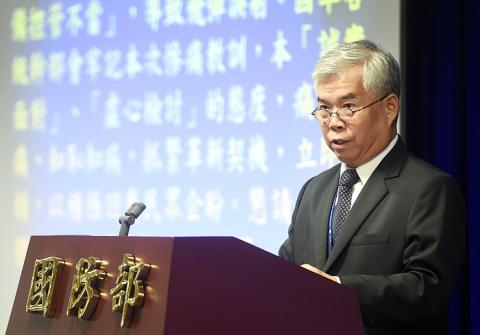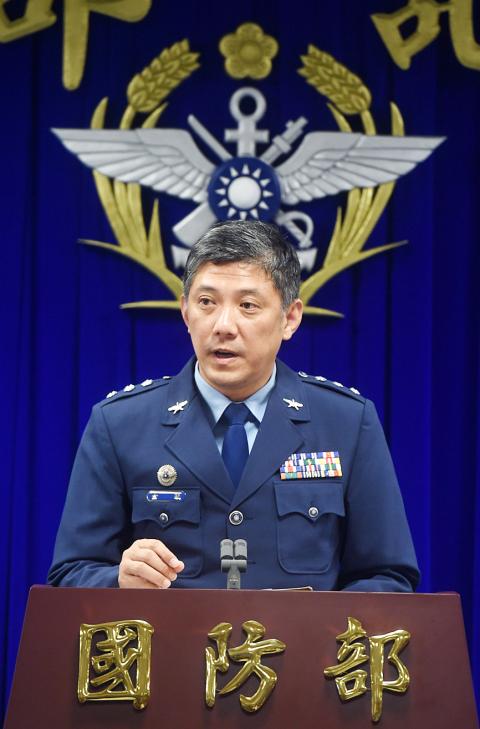The Ministry of National Defense (MND) yesterday released the results of its investigation into an accidental missile launch last month, saying a series of missteps and procedural violations caused the mishap.
A Hsiung Feng III supersonic anti-ship missile was accidentally launched from a Kaohsiung-based Chinchiang-class corvette ahead of a training exercise on July 1. The missile ripped through a fishing boat, killing the boat’s captain, Huang Wen-chung (黃文忠), and injuring three crew members.
The missile was launched because Petty Officer Second Class Kao Chia-chun (高嘉駿) accidentally connected unnecessary fire plugs — a connector assembly used to send launch orders, to a missile launcher — Navy Command Headquarters Chief of Staff Vice Admiral Mei Chia-shu (梅家樹) said.

Photo: Chien Jung-fong, Taipei Times
Kao was supposed to connect only two fire plugs, because safety devices were installed on only two of the ship’s four missiles, but he connected four, Mei said.
Kao’s supervisor, Chief Petty Officer Chen Ming-hsiu (陳銘修), should have requested only two fire plugs instead of four, while the ship’s weapon systems officers should only have given him two, Mei said.
Chen misunderstood orders for the drill, believing that all four missiles were to be prepared for the training exercise, but the exercise was only to simulate the launch of one missile, Mei said, adding that during a pre-drill rehearsal, Chen left the operations room after ordering Kao to establish two sets of firing solutions.

Photo: Chien Jung-fong, Taipei Times
According to protocol, Chen should have supervised Kao throughout the entire process, but Kao was left alone in the operations room as he went through the entire pre-launch process while rehearsing for the exercise, when he accidentally hit the launch button, Mei said.
“There were too many oversights and too much negligence. We are deeply distressed [by the incident], but we have made efforts to improve [launch procedures],” Mei said.
Asked how Chen could have misunderstood orders for the exercise, Mei said instructions were ambiguous, adding that the navy would make improvements.
“The missile system will also be redesigned to prevent accidental launches,” Mei said.
Ministry Inspector General Wu Pao-Kun (吳寶琨) said that the July 1 training exercise should not have been scheduled, because the ship’s commander had only been in command since April 11, while operational rules stipulate that such high-level drills are not allowed until a commander has been in charge for more than three months.
The ship was scheduled to begin a patrol mission immediately after the drill, and its commander, Major Lin Po-tse (林伯澤), had attended a pre-patrol meeting earlier that day, Wu added.
The tight schedule might have been a contributing factor to the accident, Wu said, adding that the ministry would prevent such scheduling issues.
“In addition to the navy’s previously announced disciplinary action, the ship’s executive officer and officers who approved the drill are to be punished for procedural violations and failing to provide proper supervision,” Wu said.
The Kaohsiung District Prosecutors’ Office yesterday charged Kao, Chen and Lieutenant Hsu Po-wei (許博為), the ship’s weapon systems officer, with causing the incident.
Kao was charged with negligence resulting in the death of the fishing boat’s captain, which could result in a five-year jail term if he is found guilty.
Chen and Hsu were charged with neglecting their duties and causing an accident, which carry a total prison term of three to 10 years.

MAKING WAVES: China’s maritime militia could become a nontraditional threat in war, clogging up shipping lanes to prevent US or Japanese intervention, a report said About 1,900 Chinese ships flying flags of convenience and fishing vessels that participated in China’s military exercises around Taiwan last month and in January have been listed for monitoring, Coast Guard Administration (CGA) Deputy Director-General Hsieh Ching-chin (謝慶欽) said yesterday. Following amendments to the Commercial Port Act (商港法) and the Law of Ships (船舶法) last month, the CGA can designate possible berthing areas or deny ports of call for vessels suspected of loitering around areas where undersea cables can be accessed, Oceans Affairs Council Minister Kuan Bi-ling (管碧玲) said. The list of suspected ships, originally 300, had risen to about 1,900 as

Right-wing political scientist Laura Fernandez on Sunday won Costa Rica’s presidential election by a landslide, after promising to crack down on rising violence linked to the cocaine trade. Fernandez’s nearest rival, economist Alvaro Ramos, conceded defeat as results showed the ruling party far exceeding the threshold of 40 percent needed to avoid a runoff. With 94 percent of polling stations counted, the political heir of outgoing Costa Rican President Rodrigo Chaves had captured 48.3 percent of the vote compared with Ramos’ 33.4 percent, the Supreme Electoral Tribunal said. As soon as the first results were announced, members of Fernandez’s Sovereign People’s Party

MORE RESPONSIBILITY: Draftees would be expected to fight alongside professional soldiers, likely requiring the transformation of some training brigades into combat units The armed forces are to start incorporating new conscripts into combined arms brigades this year to enhance combat readiness, the Executive Yuan’s latest policy report said. The new policy would affect Taiwanese men entering the military for their compulsory service, which was extended to one year under reforms by then-president Tsai Ing-wen (蔡英文) in 2022. The conscripts would be trained to operate machine guns, uncrewed aerial vehicles, anti-tank guided missile launchers and Stinger air defense systems, the report said, adding that the basic training would be lengthened to eight weeks. After basic training, conscripts would be sorted into infantry battalions that would take

GROWING AMBITIONS: The scale and tempo of the operations show that the Strait has become the core theater for China to expand its security interests, the report said Chinese military aircraft incursions around Taiwan have surged nearly 15-fold over the past five years, according to a report released yesterday by the Democratic Progressive Party’s (DPP) Department of China Affairs. Sorties in the Taiwan Strait were previously irregular, totaling 380 in 2020, but have since evolved into routine operations, the report showed. “This demonstrates that the Taiwan Strait has become both the starting point and testing ground for Beijing’s expansionist ambitions,” it said. Driven by military expansionism, China is systematically pursuing actions aimed at altering the regional “status quo,” the department said, adding that Taiwan represents the most critical link in China’s